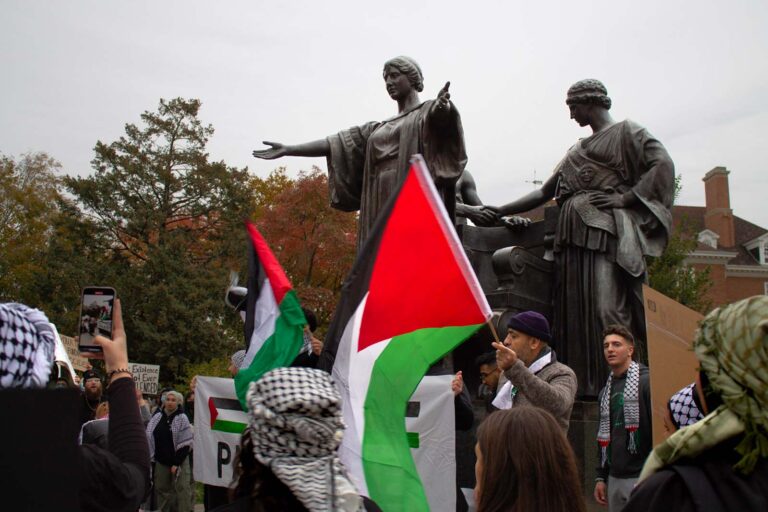Palestinian Americans are grieving the loss of tens of thousands of people in Gaza, including their own family members and loved ones.
One young woman in Champaign, who attends the University of Illinois at Urbana-Champaign, shared her story with the student newsroom at Illinois Public Media. She asked that we not use her name out of concern for her safety.
She shared how, in recent weeks, she lost a majority of her dad’s side of the family — including her grandmother.
This interview has been edited for length and clarity.
Tell me about your family in Palestine.
So, I’m named after my sittu — or my grandmother. The first time I visited [Palestine], I was about six or seven years old. And I remember my grandmother; she was talking to me. She was like, “Tell me about who you want to be.”
I remember telling her, “I want to actually bring world peace and actually make change.” I remember as a kid, whenever I would share this dream with other people, a common reaction I would get would be “Oh, that’s so cute.” But, when I would talk with my grandmother, she took it very seriously. She made it feel very important.
To this day, I’m committed to making a change in the world. My grandmother played a significant role because, from a young age, she would take me seriously and encourage me.
Her death was truly a very large loss for this world. The last thing she deserved was that death. She deserved to pass away peacefully surrounded by her loved ones.
Shortly after receiving news that several of your family members had died in Gaza, you decided to speak at a protest for Palestine. Walk me through that decision. Why did you decide to speak up?
Even though everyone passes away, the way that my family passed away is very cruel, and it’s very inhumane.
The truth of the matter is it’s kind of seen as these [civilian casualties] are just the crimes that happen in third world countries. You know, no one really thinks too much when they hear about crimes like this [in third-world countries]. It’s just another person, another crime.
There’s a true emotional toll that it takes on you to learn about these sorts of things [world events]. But I mean, what is the price of that emotional toll compared to what is actually happening in the world? No one wants to be a bad person, right? No one wants to be a bad person and take a side.
But the truth is: not doing anything, or being silent, is a choice.
I lost half of my family in one night. What do you call that? And I’m not alone. There are so many stories, we need to make sure that we are taking action, we are actually acting in a way that indicates how we actually feel, and that our actions are aligned with what our thoughts are.
That is why I decided to speak at the protests. It was very shortly after I heard the news [that my family passed]. It would have almost been disrespecting them if I did not advocate for them.
Recently, there’s been a spike in hate crimes against Palestinians, Arabs, and Muslims. A man [in Vermont] shot three Palestinian students on November 25. As a Palestinian student yourself, how do you feel about this?
The way that Palestine is talked about in the media — especially in Western media — there’s a lot of bias that has a much, much wider impact than not just sharing the full story. It also causes many different people to just not really understand the extent of what’s happening, and even compelling them into violent actions against Palestinians.
Palestinians who are already, honestly, just enduring a lot. Even in Illinois, there was the story of the young boy who was murdered by his landlord.
There aren’t enough people actually standing up and saying, “This is not okay. I will not stand for these crimes. I will talk to my legislators and let them know that I do not think that this is the right thing we should be doing with our taxpayer money. I really do not think we should be giving a blank check for billions of dollars, which is resulting in so many deaths, so much harm, and so much destruction.”
That [people not standing up] is an example of what happens when hate goes unchecked. When violence goes unchecked, and there’s no accountability.
How do you want people to remember your family and the other Palestinians who have passed?
I wish I didn’t have to answer this question; because all of these people deserve to speak for themselves on how they want to be remembered. [They deserve] to actually be given a real fighting chance to see their dreams actualized.
I think it’s very important to remember that in spite of all of this destruction that’s happening and the pain that’s being inflicted on the Palestinian people, the Palestinian people are [still] very strong.
When communications were cut during that blackout or when the shells were raining down on them through the night… [despite] the horrors that they went through, the Palestinian people basically rebuilt their communication system. I mean, what does that tell you? These are people with barely any water, barely any food.
The last thing that the Palestinian people need is pity. What they need is for society to stand by the principles that it proclaims to have: equality, fairness, and justice. These are principles we are so proud of, yet they’re being violated and we’re not doing anything about it.

